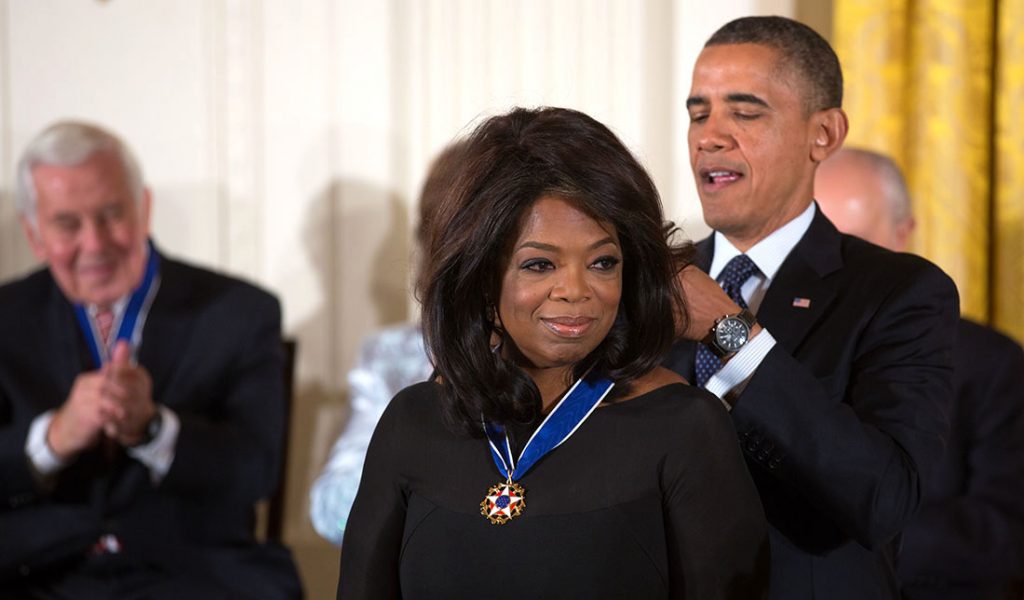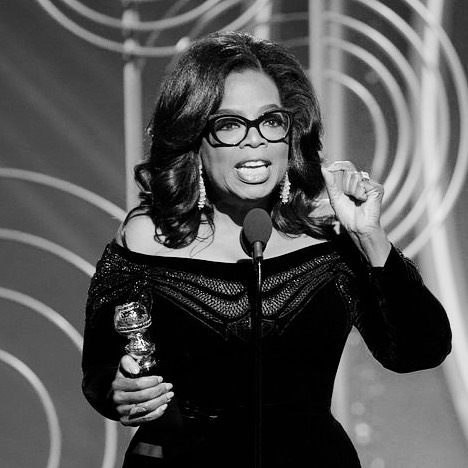Oprah, the Alabama Crimson Tide, and how to adjust to change

This year’s NCAA national football championship was won in dramatic fashion by the University of Alabama.
Most remarkable was that the game was actually a tale of two halfs. The first half was dominated by the Georgia Bulldogs, and the second by the Alabama Crimson Tide.
Alabama’s coach Nick Saban recognized that they couldn’t win doing what they’d been doing in the first half. At halftime, he brought in freshman quarterback Tua Tagovailoa. Saban felt Tagovailoa would have a better chance given his superior passing game. It was risky, but Saban felt he wasn’t going to win by doing what he’d been doing.
In the software development world, this process of trying something, seeing what happens, and then adjusting accordingly is known as agile development.
What’s agile development got to do with Oprah Winfrey?
Since Oprah’s Golden Globe speech there has been rampant speculation about whether she’d run for president or not, so much speculation that it even drove the current train wreck administration from the news cycle for a few minutes, like the sun breaking through the clouds.

There were the positive comments: Her experience as a businesswoman, her philanthropy, her media savvy, her name recognition (she doesn’t even need a last name), and her ability to inspire people.
There were also some negative comments: Her lack of political experience, a frustration with candidates who don’t have political experience, some of her past support for quacks like Dr. Phil and Dr. Oz.
Rather than argue one or the other, let’s talk about these criteria the way someone like Nick Saban might think about them in terms of what it would take to win: what’s been working, what hasn’t. Then let’s look at ways we can test some of this out.
The Democratic base
Firing up the Democratic base: In Alabama, this base was led by black women. We want someone who inspires and fires up women, especially black women.
Let me be clear: We won in Alabama and Virginia because #BlackWomen led us to victory. Black women are the backbone of the Democratic Party, and we can’t take that for granted. Period.— Tom Perez (@TomPerez) December 13, 2017
It’s unlikely anyone outside of Barack or Michelle Obama could fire up the Democratic base more than Oprah.
Inspiration
The role of president is largely a visionary one, and this was probably one of the biggest things missing from Hillary Clinton’s campaign.
Clinton never had a good reason why she was running. In the book Shattered, one of her election aides posed her problem as this:
How do you take credit for eight years of Democratic progress, but also get that things haven’t gone far enough?
The answer should have been: be honest with people. You simply say, “We’ve made progress, but we haven’t gone far enough.”
You give them a reason to believe. I saw Clinton twice during the 2016 campaign season and didn’t see a reason to believe other than, “That guy over there is much worse.”
The reason this is important is because you can’t tell people to work together. Don’t believe me? Try it. Try telling someone that we need unity. What it always sounds like is: I want you to fight with me. In a sense, this is exactly what Hillary asked in her campaign slogan: “I’m with her.” The message is unite with me. Meanwhile, Trump, through all his babbling at least had an aspirational goal: “Make America great.”
A much better way is to inspire people to fight alongside you. Forget Oprah’s Golden Globe speech. Watch her speak to Stanford graduates.
The secret I’ve learned to getting ahead is being open to the lessons. It’s being able to walk through life eager and open to self-improvement and that which is going to best help you evolve, because that’s really why we’re here – to evolve as human beings.
Media savvy
John F. Kennedy’s debate performance against Richard Nixon in 1960 was key to his win. Ronald Reagan’s experience in Hollywood and comfort in front of the media helped him become the great communicator. Bill Clinton felt our pain. FDR reached out to us through radio, the innovative communication of the day.
Communication and media savvy can’t be underestimated. The reason for this is our media.
We do not have a liberal media. We have corporate media, and corporate media operates for profit. Because corporate media operates for profit, it is concerned with scandal, celebrity, and gossip.
We don’t have to like this. We can work to change this. It is, however, our current reality.
I was talking to one of our local newspaper reporters here recently. I asked him why the paper doesn’t print more about state politics. His answer was simple: “Because people don’t read it.” But a local scandal? That gets read.
People once criticized Ariana Huffington and The Huffington Post as “an abasement to all that was journalistically sacred.” Now it’s one of the most popular political sites and has even won Pulitzer Prizes.
For a few minutes after the Golden Globes the other night, we were reading about something other than Donald Trump.
Story
Story is how people relate to you. If you have a powerful story, it can motivate and inspire people.
Donald Trump’s story in the past election was that he was a businessman, an outsider, who was going to take on Washington. Given his actions, we now see that this was laughable. His real story was that he represents established interests like oil and Wall Street. He put the foxes in charge of the hen house. Trump brought in the CEOs of Exxon and Goldman Sachs, and corporate special interest group lobbyist after lobbyist to run the country. During the election, however, he ran as a “populist,” and this story reached enough people that they were willing to overlook his obvious character flaws to take a chance. Even though his story was a lie, it gave them hope for something different than what they saw as the problem: Washington insiders.
Oprah Winfrey, on the other hand, is the self-made “man” that Trump pretends to be. Instead of inheriting $100 million, Oprah grew up in rural Mississippi without plumbing. She came from very little and made something of herself. Her story is the American dream.
I’d trust more what she tells me about business than I’d trust the guy living off daddy’s money.
Experience
Experience is important. When it comes to the position of the president, however, it doesn’t matter as much as we’d like to think it should.
The reason for this is simple. If you win, you can bring in experience. If you don’t win, all the expertise in the world isn’t going to help you.
What’s more important is that you have an answer to questions about experience, and Oprah has this from her business and philanthropic career.
Let’s test this out
I told you at the start that I’m really not as interested in Oprah as I am in what I’ll call agile politics.
Agile politics is a way to figure out what works through experimentation and reflection. Agile politics is how the Republican Party won in 2016.
What did they do that was different? They weren’t winning, so they recognized that they needed to do something different. They opened up their primary process. This allowed a non-politician like Trump to step forward and become the peoples’ favorite. The Republican establishment didn’t want Trump. They wanted Jeb. Or Marco. Or … anyone but Trump. Yet Trump won the primary pulling away.
My suggestion would be to do something similar in the Democratic primary. Use it as an opportunity not only to vet candidates on potential negatives, but also to see who inspires people. Set aside our preconceived notions of what a president should be and see who inspires and motivates the people that we want to come out and vote.
Get rid of the party insider super delegates and open up the primary so we can have stronger candidates going into the election. Trust people and make the process more democratic.
And yes, there are some negatives that someone like Oprah would have to overcome—for example, her support of folks like Dr. Oz and Dr. Phil. The primary is the place to send this stuff at our candidates and see who is able to respond well. If someone has enough big net positives, people will overlook the small stuff if you can provide an appropriate response. A good example is John F. Kennedy having to explain his Catholicism. What I personally would want to know is: How much is Oprah willing to use her celebrity and wealth to fight for average people?
Once again, this isn’t so much about Oprah as it is about democracy, agility, and a process for figuring out what works. I’ve laid out some criteria that I think are important and talked about how and what Oprah does with these criteria. But I freely acknowledge that I may be wrong. So let’s test it out. Let’s find ways to see who’s going to resonate, who can lead our Democratic base, and who can pull in independents and inspire the disenfranchised to vote.
David Akadjian is the author of The Little Book of Revolution: A Distributive Strategy for Democracy (ebook now available).










